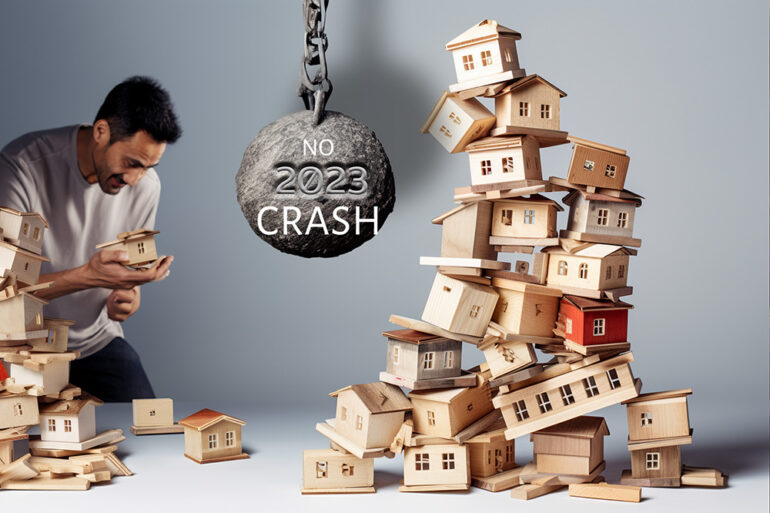Why There Will Be No 2023 Housing Market Crash!
Narratives of a real estate market crash loomed large in 2023 and for good reasons. Rising interest rates, high inflation, and an overheated real estate market were the three major concerns heading into the New Year.
Despite the worry, a 2023 real estate market crash has not materialized. In most parts of the United States, housing prices have still gone up. The Federal Reserve Bank of New York shows that housing prices went up by 1.4% year-over-year in May 2023. Most areas on the West Coast and New York saw year-over-year declines in home prices, but the country’s overall year-over-year gain has been positive.
What caused housing prices to stay afloat, and does this mean it’s time to load up on real estate? This analysis will explore some factors that kept housing prices stable and what investors should watch out for in the second half of the year.
The vetting rules have improved and increased the likelihood that borrowers can repay their mortgages.
A Lack of Housing Supply Saved Prices
When interest rates rise, housing prices are supposed to go down. Higher interest rates increase the cost of borrowing money, and that means higher mortgage payments. Since half of Americans don’t have enough funds to cover a surprise $400 bill, it made sense to assume higher interest rates would force housing prices down.
However, unlike in 2008, there is not a large volume of homes on the market. Home constructions are down, and a 500,000 construction worker shortage doesn’t suggest activity will pick up anytime soon. Some homeowners feel stuck with their current homes and low-interest mortgages, knowing they will have to commit to higher interest rates if they buy now.
If houses aren’t plentiful, buyers can’t be as picky and will have less leverage. Even though buyers face an uphill battle, sellers know they can hold out since there aren’t as many houses as possible on the market.
No NINJA Loans Make This Different From 2008
Lenders got greedy leading up to the Great Recession and offered NINJA loans. These loans cater to people who have no income, no jobs, and no assets. Naturally, many of these people could not keep up with their loan payments once the introductory rates went away. Sudden foreclosures significantly increased the housing supply and gave buyers more leverage.
The vetting rules have improved and increased the likelihood that borrowers can repay their mortgages. Rising interest rates will hurt people with variable-rate loans, but these people had and still could have the opportunity to refinance. Fixed-rate borrowers have not been affected by rising interest rates and have few reasons to sell.
If the unemployment rate grows and fewer people can afford their homes, more sellers can enter the market to very few buyers. That scenario can create the troublesome crash people have been talking about since the start of the pandemic.
Student Loan Payments Will Reduce the Buyer Pool
Student loan payments will resume on September 1st, suddenly adding hundreds of dollars in monthly expenses to people’s budgets. Roughly 43.5 million Americans have student loan debt that exceeds $1.7 trillion. The average borrower owes $37,787, which can add pressure to real estate prices.
Fewer buyers will be able to afford high monthly mortgage payments, especially with the Federal Reserve still committed to raising interest rates, albeit at a slower pace. Rising gas prices suggest high inflation may not be in the rearview mirror, and it’s a factor that real estate investors should monitor. Any disappointing inflation results can reignite the Federal Reserve and result in higher interest rate hikes.
The return of student loan payments looms over the economy. These monthly payments will reduce discretionary spending and investments, which can force companies to conduct layoffs. Consumers got a glimpse of this last year as many companies announced layoff initiatives.
Student loan payments can also reveal solid borrowers who were riskier than expected. Pausing student loan payments inflated people’s credit scores and artificially lowered their debt-to-income ratios. The return of these monthly payments can be a shock for some borrowers.
Stringent Bank Requirements Make a Collapse Less Likely
While the return of student loan payments can lead to foreclosures and a reduced buyer pool, lenders’ more stringent requirements make a full-blown crash less likely. Many financial institutions are deep in commercial mortgages.
While residential real estate surprised investors in 2023, commercial real estate has taken a hit as remote work goes mainstream. Occupancy rates have been approximately sliced in half since before the pandemic. It doesn’t help that rising crime in cities has caused some commercial real estate investors and businesses to walk away from properties.
Commercial real estate faces several challenges ahead as loans become due. The value of homes near commercial hubs can be negatively impacted since remote work gives people less incentive to stay in high-cost-of-living areas. Since banks already have these loans on their books, they may set more stringent requirements for aspiring home buyers and keep interest rates elevated.
Is The Coast Clear?
Real estate investors who commit to their assets over the long run will have a better time navigating volatility and generating returns from their properties.
Residential real estate has several protections in place that make it different from 2008. Although buyers have an uphill battle, and the buyer pool will get reduced due to student loans and other factors, the low number of sellers is helping to keep prices stable.
If the unemployment rate grows and fewer people can afford their homes, more sellers can enter the market to very few buyers. That scenario can create the troublesome crash people have been talking about since the start of the pandemic.
For real estate, location has always been vital, and it’s also important to assess location when assessing if the coast is clear. Midwest regions have seen population growth as consumers escape the higher cost of living areas. Remote work gives more people the flexibility to pursue this path.
Areas that rely on commercial properties to attract talented workers who can afford expensive mortgages may take a hit as commercial real estate woes continue. The key component holding up the real estate market is the relative lack of sellers and new constructions. This depressed supply of available homes has been enough to compensate for fewer buyers.
In any real estate market, there are opportunities. Real estate investors who commit to their assets over the long run will have a better time navigating volatility and generating returns from their properties.
The housing market can still go through a correction when student loan payments resume, especially if inflation picks up again, as we have seen with rising gas prices. Those higher prices can financially challenge people who do not have enough to cover a surprise $400 bill.
A commercial real estate crash also looms over residential properties that derive some of their value from nearby commercial real estate. However, there are more safeguards in place to prevent a 2008-style crash for residential real estate.








